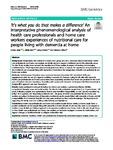‘It’s what you do that makes a difference’ An interpretative phenomenological analysis of health care professionals and home care workers experiences of nutritional care for people living with dementia at home
| dc.contributor.author | Mole, Louise | |
| dc.contributor.author | Kent, B | |
| dc.contributor.author | Hickson, Mary | |
| dc.contributor.author | Abbott, R | |
| dc.date.accessioned | 2019-09-12T12:54:36Z | |
| dc.date.issued | 2019-09-10 | |
| dc.identifier.issn | 1471-2318 | |
| dc.identifier.issn | 1471-2318 | |
| dc.identifier.other | 250 | |
| dc.identifier.uri | http://hdl.handle.net/10026.1/14914 | |
| dc.description.abstract |
<jats:title>Abstract</jats:title><jats:sec><jats:title>Background</jats:title><jats:p>People living with dementia at home are a group who are at increased risk of malnutrition. Health care professionals and home care workers, are ideally placed to support nutritional care in this vulnerable group. Yet, few, if any studies, have captured the experiences of these workers in respect of treating and managing nutritional issues. This interpretative phenomenological study aimed to explore the experiences and perceptions of the nutritional care of people living with dementia at home from the perspectives of health care professionals and home care workers.</jats:p></jats:sec><jats:sec><jats:title>Methods</jats:title><jats:p>Semi-structured interviews were conducted between December 2017 and March 2018, and supplemented with the use of a vignette outlining a scenario of a husband caring for his wife with dementia. Health care professionals and home care workers were purposively recruited from local care providers in the south west of England, who had experience of working with people with dementia. An Interpretative Phenomenological Analysis (IPA) approach was used throughout.</jats:p></jats:sec><jats:sec><jats:title>Results</jats:title><jats:p>Seven participants took part including two home care workers, a general practitioner, dietitian, occupational therapist, nurse and social worker. The time in their professions ranged from 3 to 15 years (mean = 8.9 years). Following analysis, four superordinate themes were identified: ‘responsibility to care’, ‘practice restrained by policy’, ‘in it together’, and ‘improving nutritional care’. This group of health care professionals and home care workers recognised the importance of improving nutritional care for people living with dementia at home, and felt a responsibility for it. However they felt that they were restricted by time and/or knowledge. The importance of supporting the family carer and working collaboratively was highlighted.</jats:p></jats:sec><jats:sec><jats:title>Conclusions</jats:title><jats:p>Health care professionals and home care workers require further training to better equip them to provide nutritional care for people living with dementia at home. Models of care may also need to be adapted to enable a more flexible and tailored approach to incorporate nutritional care. Future work in this area should focus on how health care professionals and home care workers can be better equipped to screen for malnutrition, and support changes to nutritional intake to mitigate malnutrition risk.</jats:p></jats:sec> | |
| dc.format.extent | 250- | |
| dc.format.medium | Electronic | |
| dc.language | en | |
| dc.language.iso | en | |
| dc.publisher | Springer Science and Business Media LLC | |
| dc.subject | Dementia | |
| dc.subject | Nutrition | |
| dc.subject | Health care professionals | |
| dc.subject | Interpretative phenomenological analysis | |
| dc.subject | Home care | |
| dc.title | ‘It’s what you do that makes a difference’ An interpretative phenomenological analysis of health care professionals and home care workers experiences of nutritional care for people living with dementia at home | |
| dc.type | journal-article | |
| dc.type | Journal Article | |
| dc.type | Research Support, Non-U.S. Gov't | |
| plymouth.author-url | https://www.webofscience.com/api/gateway?GWVersion=2&SrcApp=PARTNER_APP&SrcAuth=LinksAMR&KeyUT=WOS:000484939100001&DestLinkType=FullRecord&DestApp=ALL_WOS&UsrCustomerID=11bb513d99f797142bcfeffcc58ea008 | |
| plymouth.issue | 1 | |
| plymouth.volume | 19 | |
| plymouth.publication-status | Published | |
| plymouth.journal | BMC Geriatrics | |
| dc.identifier.doi | 10.1186/s12877-019-1270-4 | |
| plymouth.organisational-group | /Plymouth | |
| plymouth.organisational-group | /Plymouth/Faculty of Health | |
| plymouth.organisational-group | /Plymouth/Faculty of Health/School of Health Professions | |
| plymouth.organisational-group | /Plymouth/Faculty of Health/School of Nursing and Midwifery | |
| plymouth.organisational-group | /Plymouth/REF 2021 Researchers by UoA | |
| plymouth.organisational-group | /Plymouth/REF 2021 Researchers by UoA/UoA03 Allied Health Professions, Dentistry, Nursing and Pharmacy | |
| plymouth.organisational-group | /Plymouth/Research Groups | |
| plymouth.organisational-group | /Plymouth/Research Groups/Institute of Health and Community | |
| plymouth.organisational-group | /Plymouth/Research Groups/Plymouth Institute of Health and Care Research (PIHR) | |
| plymouth.organisational-group | /Plymouth/Users by role | |
| plymouth.organisational-group | /Plymouth/Users by role/Academics | |
| dc.publisher.place | England | |
| dcterms.dateAccepted | 2019-09-04 | |
| dc.rights.embargodate | 2019-12-3 | |
| dc.identifier.eissn | 1471-2318 | |
| dc.rights.embargoperiod | Not known | |
| rioxxterms.versionofrecord | 10.1186/s12877-019-1270-4 | |
| rioxxterms.licenseref.uri | http://www.rioxx.net/licenses/all-rights-reserved | |
| rioxxterms.licenseref.startdate | 2019-09-10 | |
| rioxxterms.type | Journal Article/Review |


